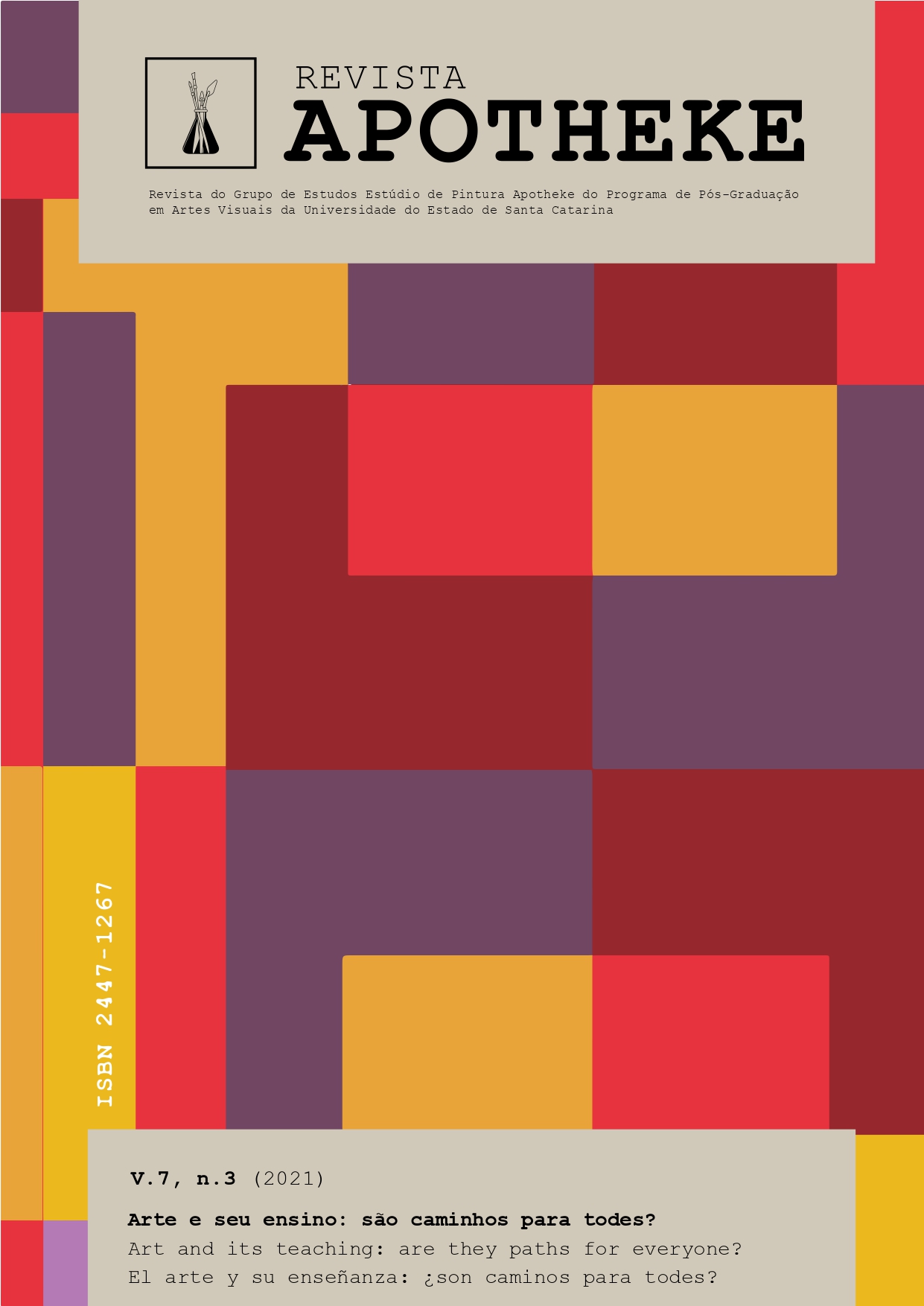Can a black woman exist?Stories for the willing
DOI:
https://doi.org/10.5965/24471267732021082Keywords:
Escrevivência, Art Education;, Racial/Ethnic Relations, CruzoAbstract
The purpose of this article is to present the narratives of three women teachers/educators and their production of presences as black female educators. These are stories that dig up memories and bring the urgency to exist and take this enchantment to their pedagogical practices crossed by the five senses. These stories intersect and can be read/ lived in various territories of our country, within any school, especially public schools, where bodies are still concentrated at the margins of the places said to be of power. These experiences intersect in singular questions: in what ways are black bodies seen in spaces, called educators? How do these bodies create epistemes from their experiences and encounters? Is there room for these encounters in education? We trawled our way through the findings of our master's research and, crossing our personal stories and the motivations that drove us to continue working in education, we created a dialogue with reflections and positions based mainly on the theories of Grada Kilomba, Bell Hooks, and Nilma Lino Gomes, researchers that also bring teachings from their experiences to theorize and practice anti-racist actions in formal and non-formal education spaces, joining the experience of Conceição Evaristo as a fertile meeting place for equals, understanding and systematization of personal and collective knowledge.
Downloads
References
ADICHE, Chimamanda Ngozi. Sejamos todos feministas. 1ª edição. São Paulo: Editora Companhia das Letras, 2015.
EVARISTO, Conceição. Olhos d’água. 1ª edição. São Paulo: Editora Pallas, 2020.
CAPIBA, Mestre. Madeira que cupim não rói. Disponível em: <https://www.youtube.com/watch?v=NK8JdRhyR08>
GOMES, Nilma Lino. Corporeidade negra e tensão regulação e emancipação social: corpo negro regulado e corpo negro emancipado. In: GOMES, Nilma Lino. O movimento Negro educador: saberes construídos nas lutas por emancipação. Petrópolis: Vozes, 2017. p. 93-100.
GOMES, Nilma Lino. Diversidade Étnico-Racial: Por um projeto educativo emancipatório. In: GOMES, Nilma Lino. Revista Retratos da Escola, Brasília, v. 2, n. 2-3, p. 95-108, jan./dez. 2008.
HOOKS, Bell. Comunidade: uma comunhão amorosa. In: HOOKS, Bell. Tudo sobre o amor: novas perspectivas. Tradução: Stephanie Borges. São Paulo: Elefante editora, 2021. p. 161-176.
HOOKS, Bell. Olhares Negros: Raça e Representação. 1ª edição. São Paulo: Editora Elefante, 2019.
HOOKS, Bell.Ensinando a transgredir: a educação como prática da liberdade. 2ª edição. São Paulo:Editora WMF Martins Fontes, 2017.
KILOMBA, Grada. Memórias da Plantação. Episódios de racismo Cotidiano. Tradução: Jess Olieveira. 1ª edição. Rio de Janeiro: Cobogó, 2019.
MUNANGA, Kabengele. Rediscutindo a Mestiçagem no Brasil. 5ª edição. Belo Horizonte: Autêntica editora, 2019.
Noemia Varela, uma vida, fazeres e pensares (2018) disponível em: https://www.youtube.com/watch?v=uo6vmtCovFw
PRANDI, Reginaldo. Mitologia dos Orixás. 22º reimpressão. São Paulo: Companhia das letras. 2001.
RUFINO, Luiz. Pedagogia das Encruzilhadas. Rio de Janeiro: Mórula Editorial, 2019.
Downloads
Published
How to Cite
Issue
Section
License
Copyright (c) 2022 Raquel Santos, Janaina Farias de Souza Ferreira, Vânia Santos

This work is licensed under a Creative Commons Attribution-NonCommercial 4.0 International License.
Copyright and Licensing Policy
Authors of works submitted to Revista APOTHEKE authorize their publication in both print and digital formats exclusively for academic purposes. Reproduction is permitted, provided that the source is properly cited. Authors confirm the originality, authorship, and unpublished status of their manuscripts.
Articles published by the journal are freely available and intended for academic and non-commercial use only. All copyrights are transferred to the journal. The content of signed articles reflects the views of their respective authors and not the official position of Revista Apotheke. The author(s) agree to always cite the following reference when republishing or referring to the content originally published in Revista Apotheke:
“This article was originally published by Revista Apotheke in volume (insert volume), number (insert number), year (insert year), and is available at: http://www.revistas.udesc.br/index.php/APOTHEKE/index”
It is the sole responsibility of the authors to obtain written permission for the use of any material protected by copyright law included in their articles. Revista Apotheke is not responsible for copyright infringements committed by contributors.
Authors retain copyright and grant the journal the right of first publication, with the work licensed under a Creative Commons Attribution-NonCommercial License (CC BY-NC):
-
Attribution (BY): Licensees are allowed to copy, distribute, display, perform, and create derivative works, provided that proper credit is given to the author or licensor, in the manner specified.
-
NonCommercial (NC): Licensees may use the material only for non-commercial purposes.
After publication, authors retain the rights to their work and may republish the text.



